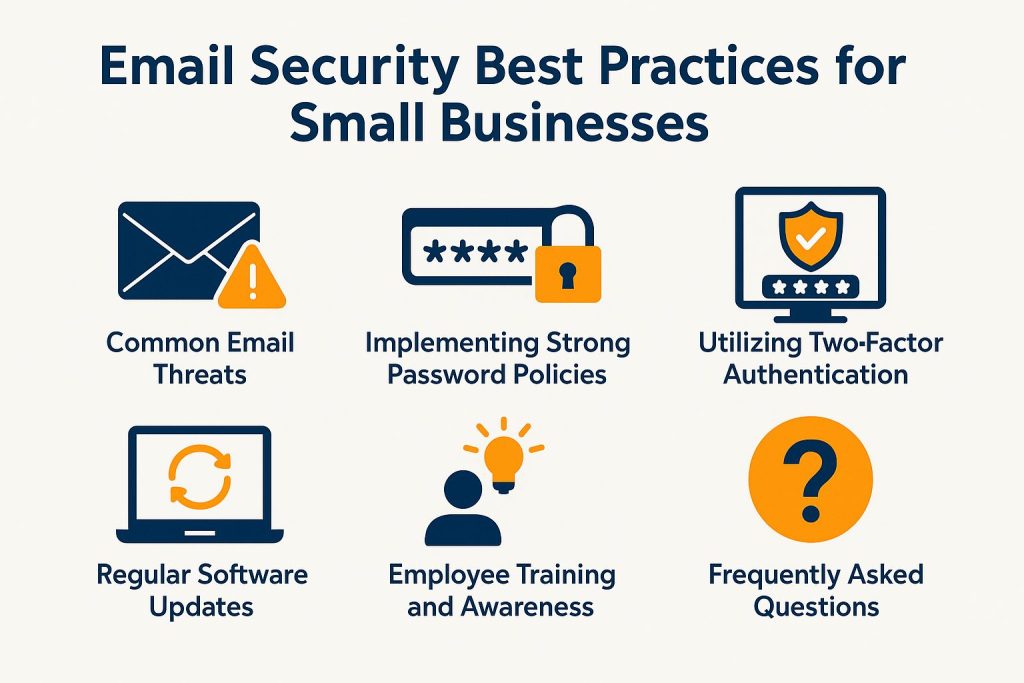Cybersecurity Essentials for Small Businesses
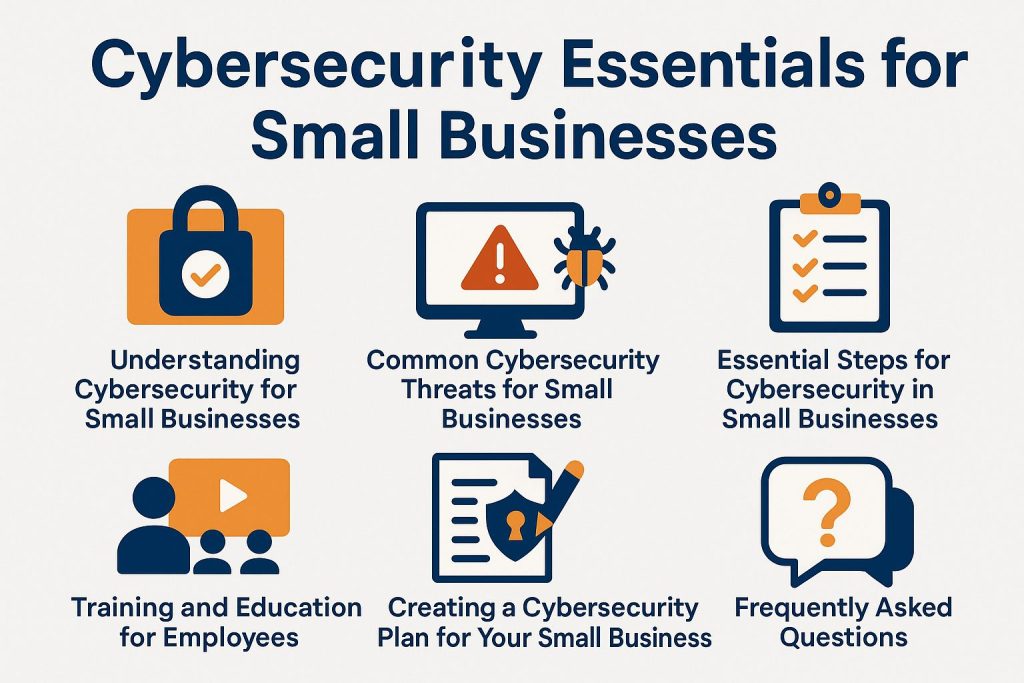
Today, small businesses are targets for cyberattacks. Robust cybersecurity is necessary. This article examines the critical importance and impact of cybersecurity on small enterprises, highlighting common threats they face and the potentially devastating consequences of such attacks.
Key steps to protect a business are: create strong passwords, use firewalls, and keep software updated. Employee training is important. This helps create a tailored cybersecurity plan. Equipping oneself with the necessary knowledge is vital to effectively protecting the business against cyber threats.
Understanding Cybersecurity for Small Businesses
Cybersecurity is crucial for small businesses. It protects data and keeps operations safe with strong security measures, emphasizing the necessity of robust data protection and network security measures. As the digital landscape continues to evolve, small businesses are increasingly vulnerable to cyber threats, including phishing attacks, malware, and insider threats.
A strong cybersecurity framework is vital; it protects sensitive data, meets regulations, and reduces data breach risks.
By implementing effective cybersecurity policies, organizations can establish a secure environment for both employees and customers, thereby fostering trust and enhancing operational efficiency.
Importance and Impact of Cybersecurity
Cybersecurity is important for small businesses. It protects data, improves IT systems, and ensures business continuity during threats.
As cyber attacks are becoming more advanced, it is essential for organizations to implement robust security strategies that not only safeguard sensitive information but also enhance overall operational stability. For example, a report by IBM indicated that the average cost of a data breach in 2023 was approximately $4.45 million, a staggering amount that could potentially cripple smaller enterprises.
Best practices include regular security audits, employee training, using encryption, and ensuring endpoint security. These practices reduce risks and help recovery. By adopting best practices like regular audits, employee training, encryption, and endpoint security, businesses can mitigate risks and recover quickly from incidents.
Furthermore, case studies of firms that have invested in comprehensive cybersecurity measures demonstrate that these efforts not only protect assets but also actively enhance their reputation and trustworthiness among clients.
Common Cybersecurity Threats for Small Businesses
Small businesses face many cyber threats. These include phishing, malware, and insider threats. Understanding these risks is key to creating effective defense strategies.
Cybercriminals frequently target small businesses due to their potentially inadequate security measures, which render them vulnerable to attacks such as DDoS (Distributed Denial of Service) attacks and cyber hygiene lapses. Furthermore, insider threats can arise from within the organization, with employees either inadvertently or intentionally compromising security.
A thorough awareness of these risks enables small business owners to prioritize their cybersecurity strategies effectively. As mentioned, adopting comprehensive solutions like managed security services can significantly enhance protection for digital assets, mitigating vulnerabilities.
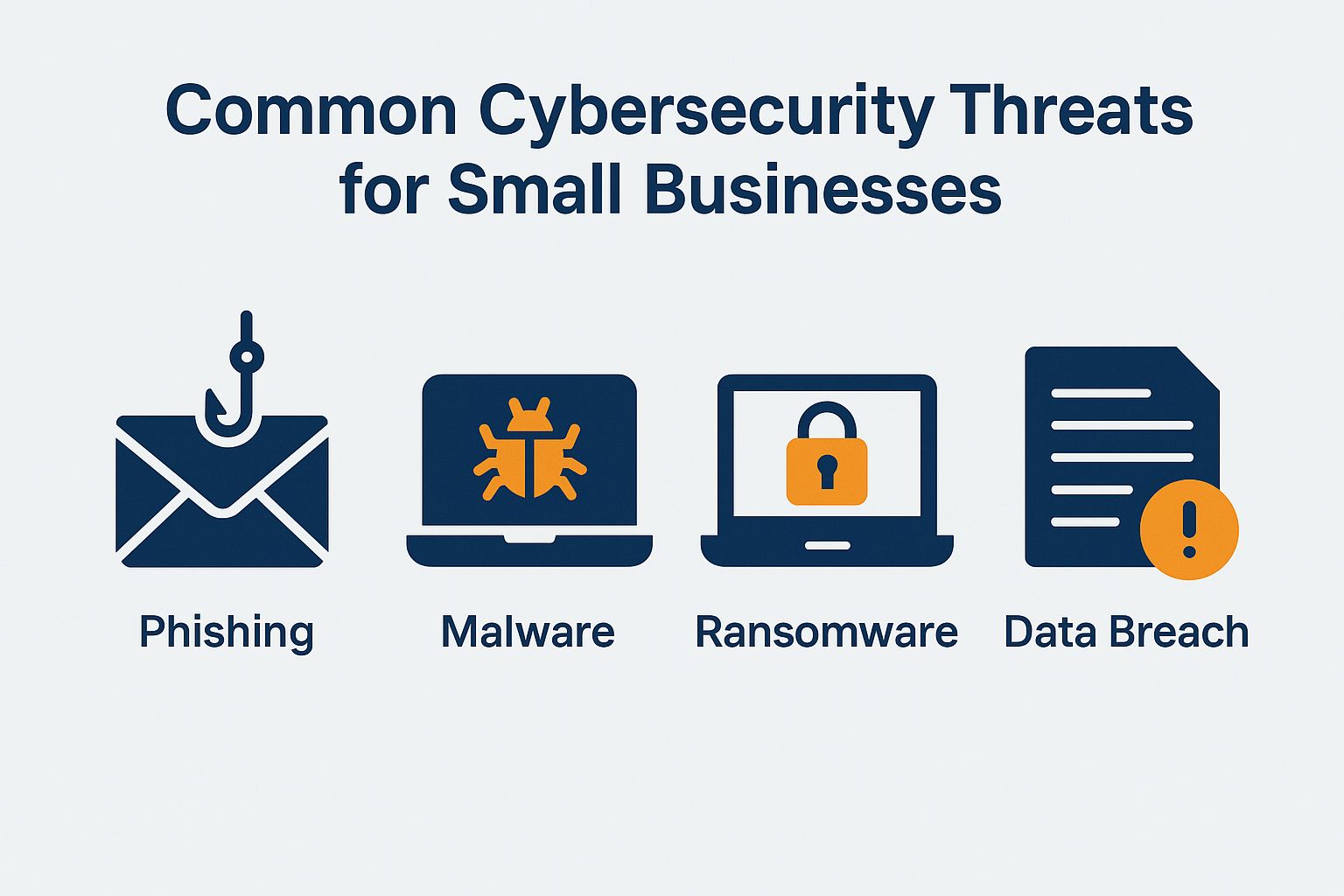
Types of Attacks and Their Consequences
Different cyber attacks, like ransomware, data breaches, and social engineering, can severely harm small businesses.
These attacks can disrupt operations. They can lock data and expose sensitive information, leading to financial loss and damage to reputation. For instance, ransomware can render critical systems inaccessible until a ransom is paid, causing service disruptions and significant downtime.
Simultaneously, data breaches can expose customer data, leading to regulatory fines and a loss of trust among clients. Social engineering tactics exploit human interactions to manipulate employees into disclosing confidential information, underscoring the necessity for robust training programs.
Small businesses must prioritize security protocols. They should also have a response plan for recovery.
Essential Steps for Cybersecurity in Small Businesses
Small businesses must implement cybersecurity measures to protect their digital assets.
Key steps include:
- Deploying firewalls
- Utilizing antivirus software
- Maintaining robust password management systems
Furthermore, using encryption for sensitive data keeps information safe. If a breach occurs, unauthorized users cannot access it. For those interested in comprehensive strategies, exploring how managed security services safeguard digital assets can provide valuable insights. Regular software updates and the use of cybersecurity tools are also vital for adapting to the continuously evolving threat landscape.
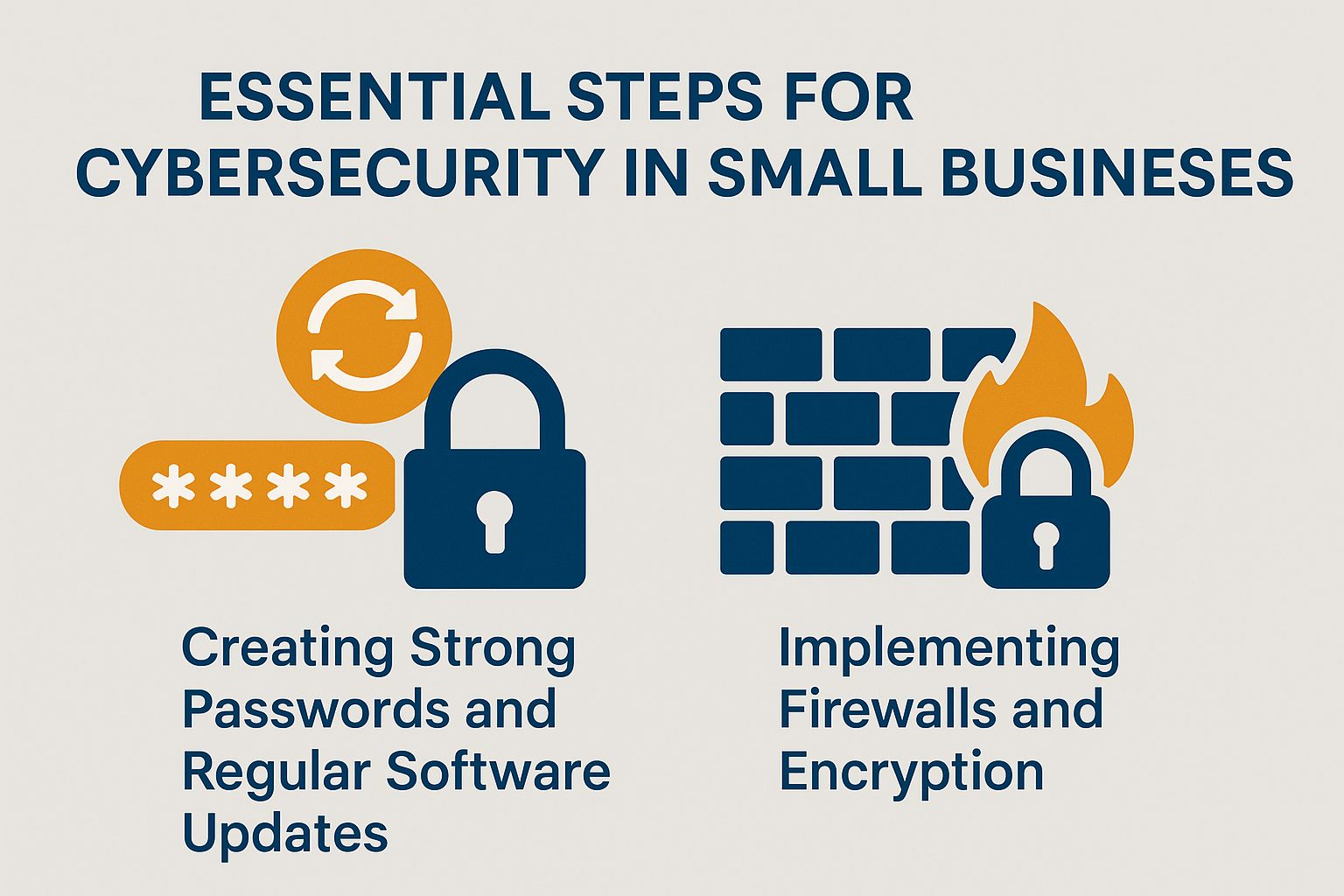
Creating Strong Passwords and Regular Software Updates
Strong passwords and regular updates are key for small business cybersecurity.
These measures significantly mitigate the risk of unauthorized access and safeguard sensitive data from potential breaches. Establishing effective password policies is crucial; passwords should be complex, incorporating uppercase letters, numbers, and special characters, while also being unique to each application or service.
Regular software updates are vital. They fix vulnerabilities and protect against threats. Additionally, it is vital for employees to participate in regular cybersecurity training, fostering a culture of compliance that promotes vigilance and awareness of phishing attempts and other cyber risks.
Implementing Firewalls and Encryption
Firewalls and encryption enhance network security. They protect sensitive information in small businesses.
These technologies play a critical role in blocking unauthorized access to networks, ensuring that malicious entities are unable to breach a business’s digital defenses. Firewalls serve as a protective barrier, scrutinizing both incoming and outgoing traffic to filter out potential threats. Simultaneously, encryption secures data during transmission by converting it into a code that can only be deciphered by authorized users.
To further strengthen this security, maintaining secure backups is crucial, as they ensure that critical data can be restored in the event of an attack. Additionally, establishing comprehensive cybersecurity policies provides guidance for employees on best practices for effectively utilizing these technologies, fostering a culture of security awareness throughout the organization.
Training and Education for Employees
Employee training is critical. Employees are the first line of defense. For further insights on building a comprehensive defense, learn more about creating a resilient IT framework.
Importance of Cybersecurity Awareness and Best Practices
Promoting cybersecurity awareness and implementing best practices within the workforce can significantly mitigate the risk of cyber incidents in small businesses. By fostering a comprehensive understanding of common threats, employees can become vigilant guardians of sensitive information.
Key components of a successful cybersecurity awareness program include:
- Regular training sessions
- Clear communication of security policies
- Engaging materials that resonate with the team
Employees should adopt best practices such as:
- Using strong, unique passwords
- Being cautious with email attachments
- Avoiding risky online behavior
Ongoing training builds a culture of security. Employees learn to report suspicious activity and protect digital assets.
Creating a Cybersecurity Plan for Small Businesses
A cybersecurity plan helps small businesses manage risks and respond to security incidents. Understanding the top cybersecurity threats facing small businesses can enhance these plans by preparing for specific challenges that may arise.
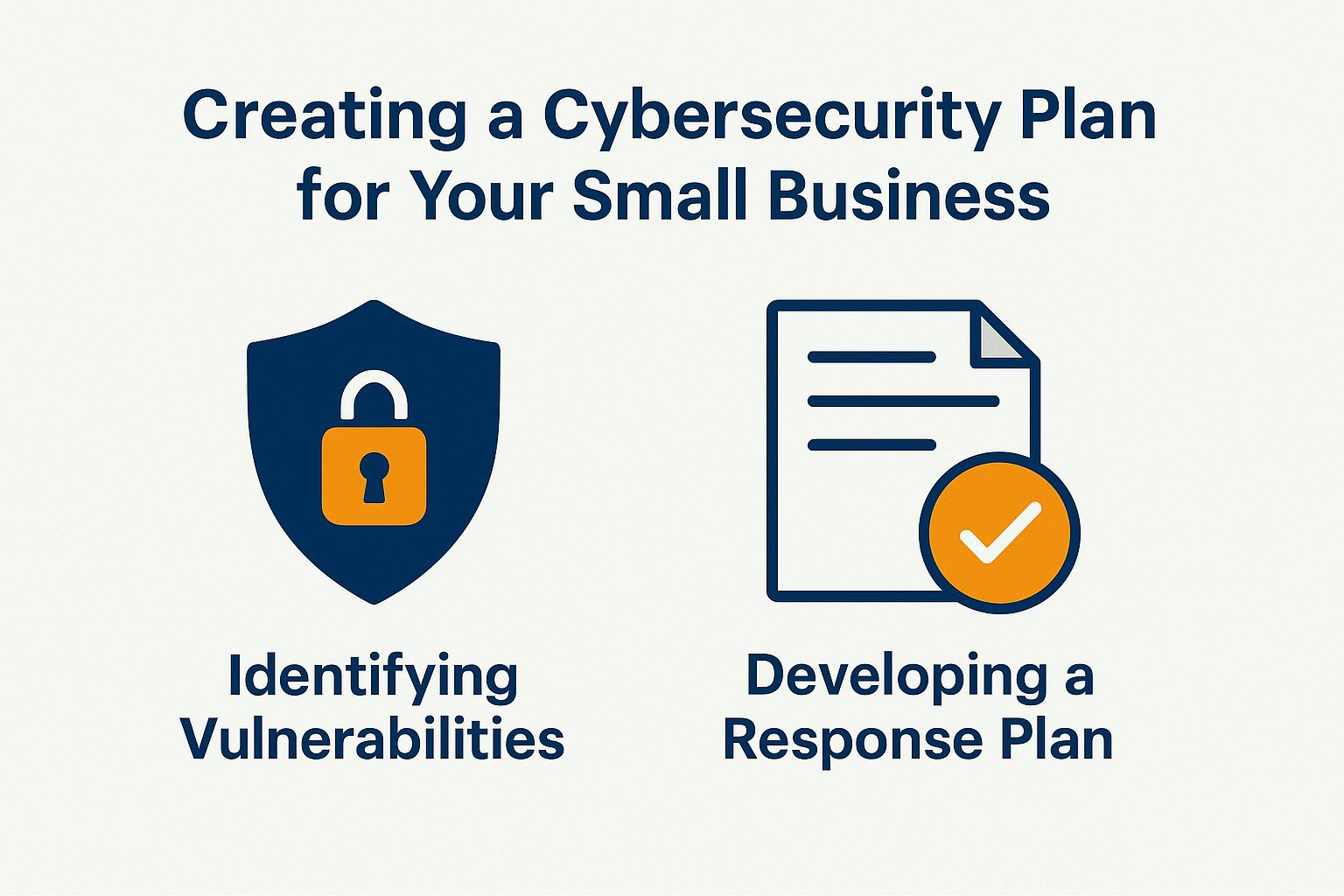
Identifying Vulnerabilities and Developing a Response Plan
Identifying vulnerabilities and creating a response plan are key parts of a good cybersecurity strategy. This includes using penetration testing tools and threat intelligence. This process involves conducting thorough vulnerability assessments, which can reveal potential weaknesses within the organization’s network infrastructure and applications.
Regular security audits are important. They help find existing security gaps and check how well current protections work.
Small businesses must have a clear and actionable breach response plan. This proactive approach helps the organization quickly reduce damage, protect sensitive data, and keep customer trust during a cybersecurity incident.
Frequently Asked Questions
Why is Cybersecurity Training Important?
Cybersecurity training is vital. It raises awareness and prepares employees for threats.
What are Cybersecurity Essentials for Small Businesses?
Cybersecurity Essentials for Small Businesses are basic practices and strategies. They help protect a small business from cyber threats and attacks. These include implementing strong passwords, regularly updating software, and training employees on cybersecurity best practices.
Why is Cybersecurity Important for Small Businesses?
Cybersecurity is important for small businesses. They are often targeted by cybercriminals because they may lack strong security controls and risk assessments. A cyber attack can result in financial loss, damage to reputation, identity theft, and loss of sensitive information, which can be devastating for a small business.
What are the Risks of Not Having Cybersecurity Measures and Secure Software Development in Place?
Without cybersecurity measures, small businesses can be vulnerable to attacks. This can lead to serious consequences. These include loss of data, financial loss, damage to reputation, legal implications, and potential security vulnerabilities.
How can Small Businesses Protect Themselves from Cyber Attacks?
Small businesses can protect themselves from cyber attacks. They should use strong passwords, enable two-factor authentication, install anti-virus software, back up data regularly, and train employees to detect and respond to threats.
Do Small Businesses Need to Invest in Expensive Cybersecurity Solutions?
Many expensive cybersecurity solutions exist. However, small businesses can also use affordable measures like cloud security and incident response to protect themselves. This includes using free antivirus software, regularly updating software, employing phishing simulations, and providing cybersecurity training for employees.
Can Small Businesses Recover from a Cyber Attack?
A cyber attack can have serious consequences for a small business. However, cyber resilience allows recovery. This includes having a response plan in place, regularly backing up important data, employing digital forensics, and seeking professional help for disaster recovery to mitigate the damage and prevent future attacks.

